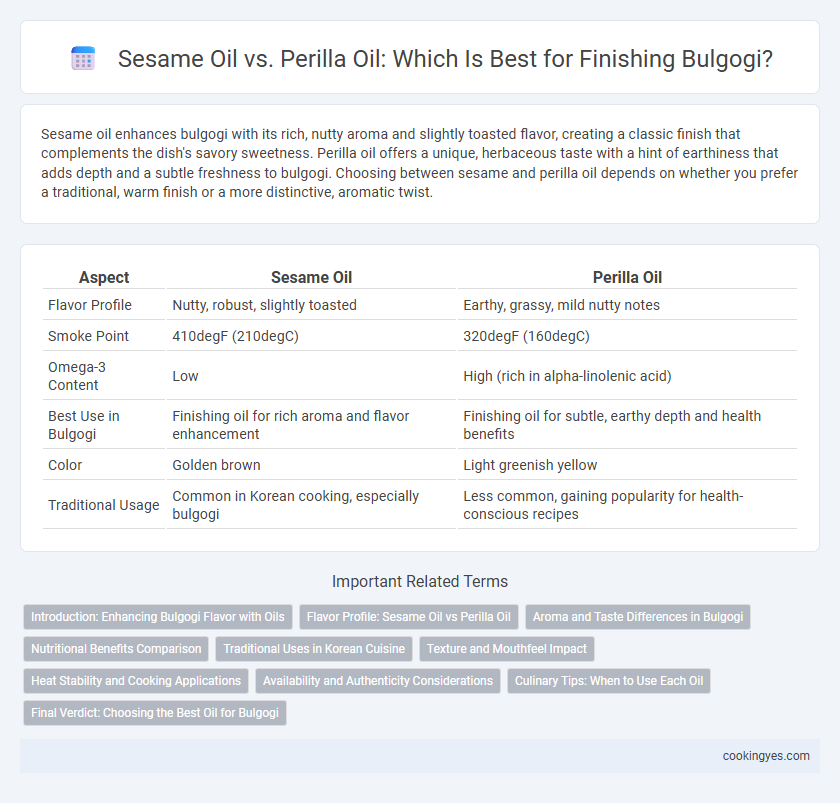Sesame oil enhances bulgogi with its rich, nutty aroma and slightly toasted flavor, creating a classic finish that complements the dish's savory sweetness. Perilla oil offers a unique, herbaceous taste with a hint of earthiness that adds depth and a subtle freshness to bulgogi. Choosing between sesame and perilla oil depends on whether you prefer a traditional, warm finish or a more distinctive, aromatic twist.
Table of Comparison
| Aspect | Sesame Oil | Perilla Oil |
|---|---|---|
| Flavor Profile | Nutty, robust, slightly toasted | Earthy, grassy, mild nutty notes |
| Smoke Point | 410degF (210degC) | 320degF (160degC) |
| Omega-3 Content | Low | High (rich in alpha-linolenic acid) |
| Best Use in Bulgogi | Finishing oil for rich aroma and flavor enhancement | Finishing oil for subtle, earthy depth and health benefits |
| Color | Golden brown | Light greenish yellow |
| Traditional Usage | Common in Korean cooking, especially bulgogi | Less common, gaining popularity for health-conscious recipes |
Introduction: Enhancing Bulgogi Flavor with Oils
Sesame oil brings a rich, nutty aroma and a smooth finish that enhances the savory depth of bulgogi, while perilla oil offers a distinct, slightly herbal flavor with a hint of nuttiness that adds complexity. Using sesame oil preserves traditional Korean taste profiles, making it the preferred choice for most recipes, whereas perilla oil provides an alternative that elevates the dish with unique, aromatic notes. Both oils contribute essential fatty acids and antioxidants, enriching the dish's flavor and nutritional value.
Flavor Profile: Sesame Oil vs Perilla Oil
Sesame oil provides a rich, nutty aroma and deep toasted flavor that enhances the savory sweetness of bulgogi, creating a traditional Korean taste profile. Perilla oil offers a unique, slightly herbal and earthy flavor with hints of mint and basil, adding complexity and freshness to the dish. Choosing between sesame and perilla oil depends on whether you prefer a warm, roasted finish or a vibrant, aromatic lift in your bulgogi.
Aroma and Taste Differences in Bulgogi
Sesame oil imparts a rich, nutty aroma and a slightly sweet, toasted flavor that enhances the savory profile of bulgogi, creating a warm and comforting finish. Perilla oil offers a distinct, grassy aroma with a mildly pungent and earthy taste, adding complexity and a fresh herbal note to the dish. Choosing between these oils affects the bulgogi's flavor depth and aromatic character, with sesame oil providing traditional richness and perilla oil delivering a unique, vibrant twist.
Nutritional Benefits Comparison
Sesame oil contains high levels of antioxidants and essential fatty acids, including omega-6 and omega-9, which support heart health and reduce inflammation, making it a popular choice for finishing bulgogi. Perilla oil is rich in omega-3 fatty acids, particularly alpha-linolenic acid (ALA), which promotes brain health and has anti-inflammatory properties, offering a nutritional edge over sesame oil. Both oils enhance bulgogi's flavor profile while providing unique health benefits linked to their fatty acid compositions.
Traditional Uses in Korean Cuisine
Sesame oil is traditionally favored in Korean cuisine for finishing bulgogi due to its rich, nutty aroma and smooth texture, enhancing the dish's depth without overpowering the marinated beef. Perilla oil, while also used, imparts a more robust, herbal flavor and earthy notes, commonly reserved for specific regional variations or when a distinctive, bold finish is desired. Both oils contribute unique aromatic qualities, but sesame oil remains the classic choice in bulgogi preparation for its balance and familiarity in traditional recipes.
Texture and Mouthfeel Impact
Sesame oil adds a rich, nutty aroma and creates a smooth, slightly oily texture that enhances the succulent tenderness of bulgogi. Perilla oil offers a lighter, herbaceous note with a subtle grassy flavor, contributing a silkier mouthfeel that balances the savory marinade without overpowering it. The choice between sesame and perilla oil influences the final bulgogi texture by either deepening the richness or introducing a refreshing softness on the palate.
Heat Stability and Cooking Applications
Sesame oil, known for its rich aroma and moderate heat stability, is ideal for finishing bulgogi as it enhances flavor without breaking down under low to medium heat. Perilla oil offers higher heat stability, making it suitable for cooking bulgogi over higher temperatures, preserving its nutty taste while maintaining nutritional benefits. Choosing between sesame and perilla oil depends on whether bulgogi is finished with a flavorful drizzle or cooked over intense heat, balancing taste and heat endurance.
Availability and Authenticity Considerations
Sesame oil is widely available and commonly used in Bulgogi for its toasty aroma and authentic Korean flavor, making it a staple in most households and restaurants. Perilla oil, while less accessible and more region-specific, offers a unique, nutty taste that aligns with traditional Korean cuisine but may be harder to find outside Korea. Choosing between sesame and perilla oil depends on balancing the ease of purchase with the desire for a more genuine, distinctive finish.
Culinary Tips: When to Use Each Oil
Sesame oil enhances bulgogi with its nutty aroma and rich flavor, best added at the end of cooking to preserve its fragrance. Perilla oil imparts a subtle, slightly herbal taste, ideal for drizzling just before serving to complement the marinated beef without overpowering it. Choosing the right oil depends on desired flavor intensity: sesame oil for bold nuttiness, perilla oil for delicate herbal notes in bulgogi dishes.
Final Verdict: Choosing the Best Oil for Bulgogi
Sesame oil enhances Bulgogi with a rich, nutty aroma and a smooth, toasted flavor profile that complements the marinated beef perfectly, making it the preferred choice in traditional Korean cooking. Perilla oil offers a unique, earthy undertone with a slightly grassy and herbal note, adding complexity but a less iconic taste compared to sesame oil. For the best Bulgogi finish, sesame oil remains the top recommendation due to its balanced flavor and authentic contribution to the dish's signature taste.
Sesame oil vs perilla oil for bulgogi finish Infographic

 cookingyes.com
cookingyes.com